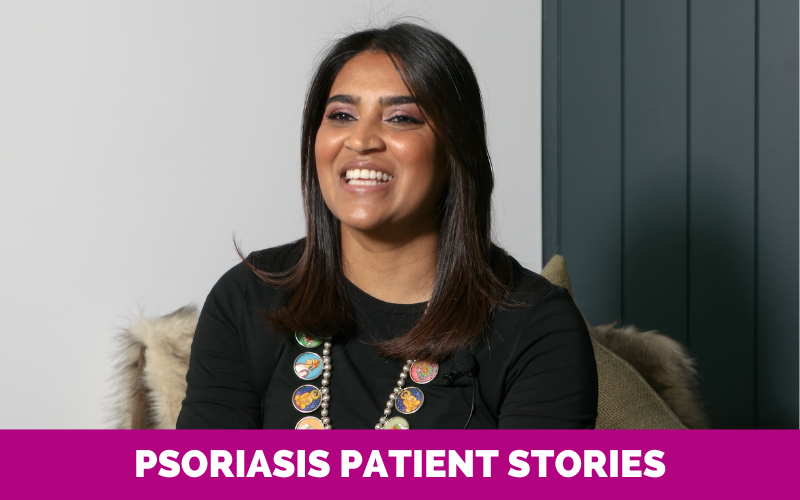How to build your psoriasis healthcare team
One of the realities of having psoriasis or other chronic health conditions is that you will most likely need to see a range of healthcare professionals over many years.
It is always a good idea to have someone to act like a ringmaster and manage all the different aspects of your care. For example, you might see a GP, medical specialist, physiotherapist and psychologist. They all help you within their scope of practice but communication between them can often be patchy.
Your GP is usually the one who liaises with your other team members but they may not have a complete record of the recommendations or treatments other members have initiated. However, stepping into the ringmaster’s role and managing your own support team will help you:
- Gain a better understanding of your condition.
- Have a central record of communications from your team members to you and to each other.
- Determine which treatments are right for you.
- Help you manage your health more holistically.
It also helps you to have a sense of empowerment and control over your condition rather than the other way around. You get to choose who is on your team and what role they will play in supporting you.
Who can I have on my team?
Your support team doesn’t have to only include health professionals. Think about including the people closest to you, such as your partner, favourite relatives, close friends, carer or anyone else you know will help you with your day-to-day needs. They will give you the physical or emotional support you will need to help manage the bad days as well as the good ones.
General practitioner
Your GP will be an essential member of your team so it is ideal that you have one that you like and trust. They can help you with many aspects of your care, including educating you about your condition and treatments and tracking your progress. Your GP can also set up a Chronic Disease Management Plan and/or a Mental Health Treatment Plan (via the Better Access Initiative) to help cover the cost of relevant allied health services.
Specialist clinicians
Your team could include several specialist clinicians depending on your needs.
A dermatologist specialises in conditions that affect the skin, hair and nails, including psoriasis and psoriatic arthritis. They can help you select appropriate treatments such as topical creams, light therapy and oral medications to suppress your immune system. They have the authority to prescribe advanced medications, such as biologics, to treat psoriasis.
A rheumatologist will assess and help you manage conditions that affect your joints and the soft tissue that surrounds them. They can also treat related conditions that affect other parts of the body, such as the eyes, skin, internal organs and the nervous system. Like a dermatologist, they can treat both psoriasis and psoriatic arthritis.
Your GP can help you determine if you should see a rheumatologist or a dermatologist first. This decision is usually based on the symptoms that concern you the most.
You may want a psychologist or psychiatrist on your team. Both can treat a wide range of mental health issues using approaches like Cognitive Behaviour Therapy. Both have studied extensively but a simple way to distinguish them is that a psychiatrist can prescribe medicine. They will work with you over a series of appointments and give you the coping tools you will need to handle all the stressful issues that come with chronic pain and invisible illnesses.
Some often overlooked but very useful members of your support team could be your specialist’s personal assistant, nurse practitioners, pathology nurses or health clinic nurses. Nurses are usually qualified to discuss medications with you and can answer many questions you would normally ask your doctor.
A general physician specialises in the care of patients with multiple or complex disorders. They can assist with the diagnosis of difficult problems, the management of interacting conditions or medications and the assessment and preparation of patients with serious medical issues requiring surgery.
Other specialists on your team could include an endocrinologist, ophthalmologist, haematologist, surgeon or even a dentist.
Other health professionals
Many people include an exercise physiologist or physiotherapist on their team as part of their psoriasis management. Multiple research studies have shown that moderate exercise can stimulate the immune system and produce an anti-inflammatory response. Regular appropriate exercise can improve your mood and help you manage the fatigue that can come with autoimmune conditions such as psoriasis.
A dietician can show you how to establish a nutritious menu plan that works with and not against your conditions and medications. Evidence is accumulating that nutrition plays a major role in the development of psoriasis. Increased body weight, along with poor nutrition and diet, may make symptoms worse or even trigger the disease. Making even small changes to your diet can result in improved vitality.
An occupational therapist can help by finding ways to help you participate in the ‘occupations’ of your daily life. This could be at your workplace but it could also be any task or activity you regularly engage in such as shopping, driving or socialising. They may suggest modifications to your physical environment or changing the activity to help manage your pain or fatigue and support your general health and well-being.
To help your body function at its optimum level you could also include a podiatrist, chiropractor or osteopath in your team.
Team members from the wider community
Your local pharmacist should be an essential part of your team. They can give you advice on your medications, answer questions about general medical concerns, keep track of your prescriptions and much more.
Some autoimmune conditions and medications can affect the health of your eyes. It is a good idea to have regular check-ups with your optometrist so they can detect and manage any issues as early as possible.
Peer support groups are full of people going through similar challenges to you. The members understand things like fatigue and “brain fog”, disclosing your health issues at work and coping with chronic pain while trying to maintain a “normal” life. You can share your experiences and ask questions in a friendly and non-judgemental environment.
How do I decide who to include?
Your GP can help you choose your main team members. They will consider your needs and circumstances and refer you to the appropriate specialists. You can also ask people you trust such as a family member, friend or someone in your support group for their recommendations.
Choosing the right person to be in your team is a bit like hiring a new employee. First impressions and gut feelings do count. Sometimes you connect with somebody instantly and other times your instinct may tell you to steer clear.
It’s a good idea to create a shortlist of practitioners you are considering for various roles in your team. Check their credentials and see if they are members of professional associations. You can even give them a test run by booking an initial appointment with them before deciding if you want to come back to them regularly.
What if I don’t like them or agree with their opinion?
If your team is going to function effectively, each member needs to be someone you trust, that listens to you, takes you seriously and makes decisions with you and not for you. It is important that they are all aware of each other and are willing to work with each other.
If you don’t feel comfortable with that person or you disagree with their approach you are perfectly entitled to seek a second opinion. You don’t have to use a specialist that your GP referred you to if you don’t want to. You also don’t have to stick to the same GP if you feel they are not meeting your health care needs.
It is quite acceptable to book an initial appointment with a different practitioner to see if they are a better fit for you. You are also entitled to have your records transferred to your new practitioner. Don’t be embarrassed about it, it is a common practice and they are unlikely to take it personally.
Where do I find them?
Your GP will have lists of many other healthcare providers in your area.
Organisations such as Psoriasis Australia, Arthritis Australia and professional associations have a list of service providers in many areas. You can browse their websites or call their support phone lines.
There are many online directories, including the Federal Government’s Healthdirect website, catering to different fields of health care. Often you simply need to enter your postcode and the site will automatically generate a list of service providers near you.
The people in your peer support groups can give personal recommendations for a range of practitioners. Keep in mind that we are all different and you may not like the person that your friend suggests.
How do I pay for it all?
Medicare provides a range of options to help you cover the cost of your health care. You can claim some or all of the cost of seeing a GP and many other healthcare professionals. Sometimes you may have to pay the difference between Medicare’s scheduled fee and the doctor’s actual fee.
If you have a pension or allowance from Centrelink, you may be entitled to a Pensioner Concession Card or a Health Care Card. These entitle you to discounts for many health care services.
Australian federal and state governments provide an extensive range of support services and financial benefits for people with chronic conditions. You can also access other supports through local health and community organisations.
Private health insurance providers offer benefits that you can claim for services provided by many private healthcare practitioners. Your cover could include optical, dental, chiropractic or a wide variety of other services. Some also provide wellness programmes or cover the cost of membership for disease management associations such as Arthritis Australia. It is important to check the details of your cover and see if it is giving you the best value for your current needs.
Where to from here?
When you have so many people in your team you need to be organised. Keep a list of all your current medications and give it to all your relevant team members. Know when your appointments are and have a list of questions or points to discuss before you go. There are many smartphone apps and online resources available to help make your day-to-day life easier to manage.
Your team can include many different people all working to help you live well with your chronic condition but the most important member of your team is YOU. The more you know about your condition and utilise the people and resources around you, the easier your life will be.
Sign up for our Psoriasis Wellness email series to receive more information on fatigue, mental health, diet and exercise and finding support for people with psoriasis.
The content on this page has been adapted from a corresponding page on the CreakyJoints Australia website. Some content has been changed to suit people with psoriasis.
Helpful resources
International resources





